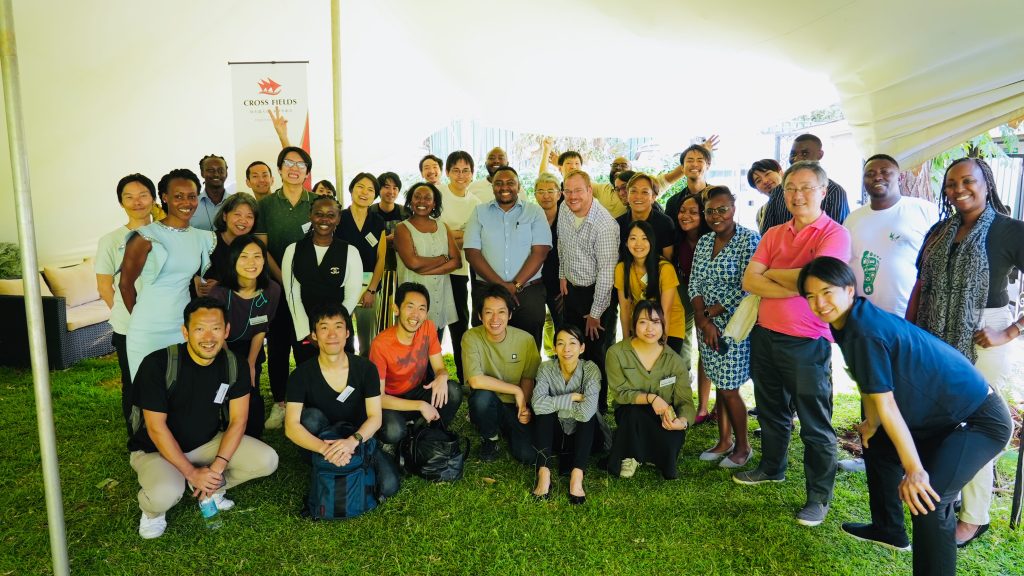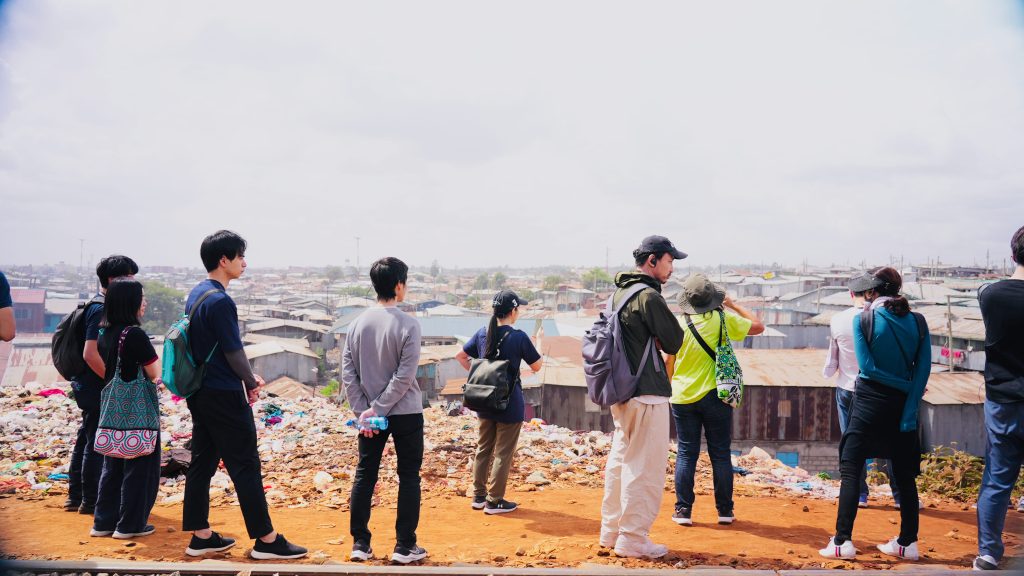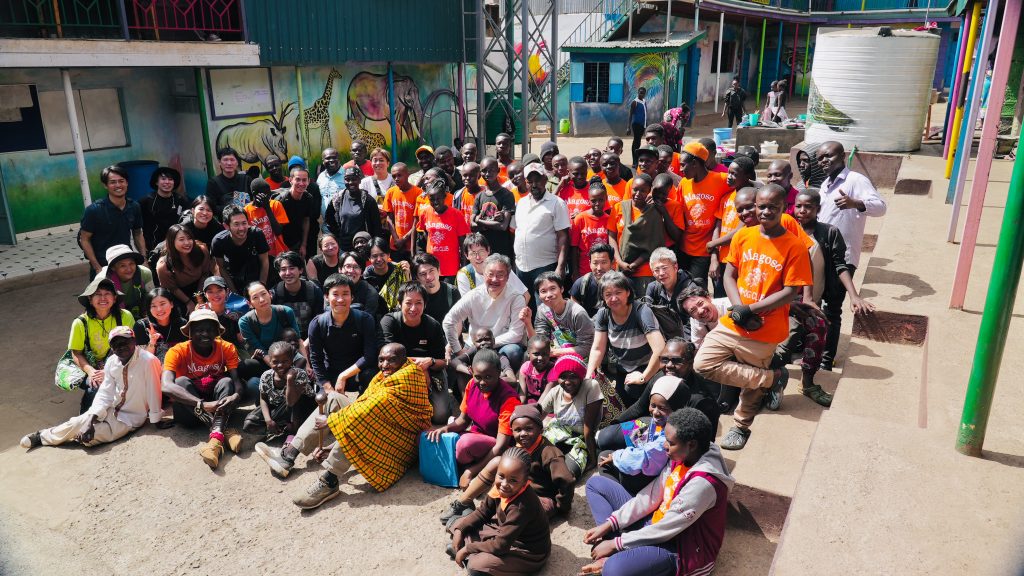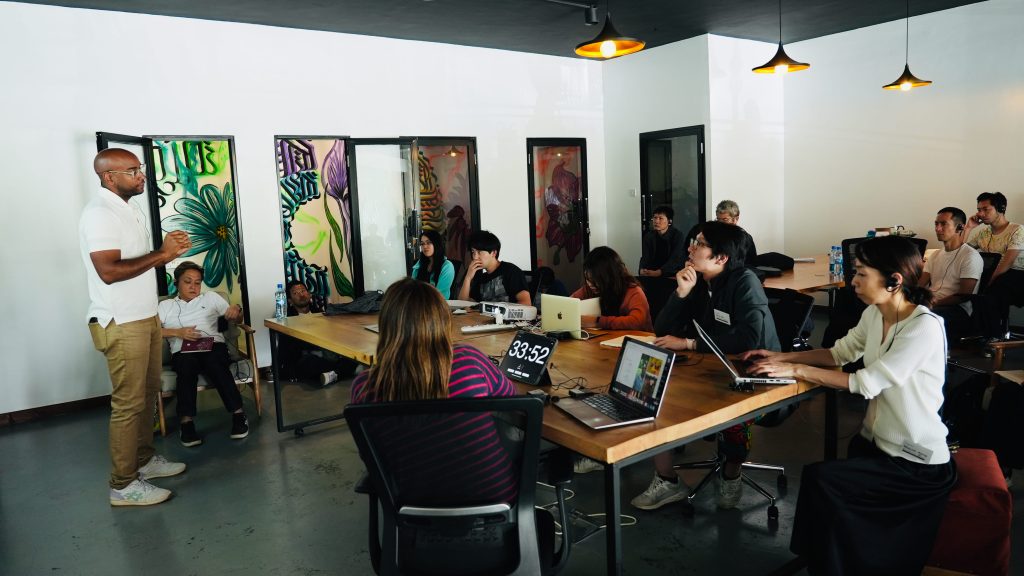Kenya is well known for its beautiful wildlife and safari tours, but through our visit we learned that this only grasps a tiny bit of the whole picture. The moment you leave the airport and drive through the streets of Nairobi, you will see tall office buildings, fancy cafes, and supermarkets with a corner just for organic foods. Every payment you can think of, including those local stands selling bananas on the street, could be done by a smartphone app called M-Pesa; convincing us that fintech is much more widespread here than in Tokyo. Nairobi is also a vibrant hub for startups, which can be noticed from the variety of incubation centers and coworking spaces. Every moment during our stay was full of surprises, shock, excitement and hope.
About the Social Innovation Mission (SIM) Program
In January this year, we Cross Fields organized a one-week study tour program called Social Innovation Mission (SIM) in Nairobi, Kenya. SIM, which is the fourth time to be held, is a program in which corporate executives from various Japanese companies visit a country outside of Japan to learn about its social issues, witness the approaches taken by local social leaders/organizations to tackle them, and explore how they themselves and their company can solve social issues. This year, as the first program to be held since the spread of COVID-19, Kenya was chosen as our destination. A total of 20 participants from 14 different major companies and startups joined the program.
(You can watch a digest video of SIM Kenya here: Social Innovation Mission 2023 in Kenya [English subtitles])

During the program, we first spent a few days visiting various sites in Nairobi, from shopping malls to slums, to grasp a sense of daily life. Then, we visited a total of 10 startups and 2 incubation centers tackling social issues in the fields of mobility, agriculture, fintech, environment, and healthcare. During the visits, the participants not only listened to the presentations by the leaders of these startups, but also discussed directly with them on the depth and complexity of social issues.
Visiting Kibera Slum
Among the various sites we visited, one of the memorable moments we would like to share is our visit to Kibera Slum on Day 3.
Kibera Slum is known as the largest slum in East Africa, estimated to be a home for about one million people. It is located only about 6 kilometers away from the city center, bordered by a well-tended golf course and an estate where embassies stand. The moment you step into Kibera, you will see a huge neighborhood spread out in front of you, with about a hundred shacks aligned together in one block. We were told that one whole family, which can be more than ten members, live in one shack, and that there are almost no services for stable electricity, access to water, sanitation, gas nor healthcare.

Walking along a railway line, with hills of garbage on one side and shops selling clothes on another, Ms. Chiaki Hayakawa kindly guided us through and explained to us about what life here is like. Ms. Hayakawa is the co-founder of Magoso School, a school in Kibera that now consists of over 500 students, who are mainly children living in poverty and other difficult situations. According to her, life here is not easy. Every time it rains, garbage and other waste flows down into the neighborhood, flooding the shacks. Not only do the residents lose the space to sleep, the living conditions become extremely unhygienic, causing many people to become ill.
Visiting Magoso School
On the other hand, we were made to realize that these struggles were only one side of living in Kibera. As we stepped inside Magoso School, the students welcomed us with huge smiles on their faces, running toward us and asking for high-fives. They gathered together to sing and dance, accompanied by the beating of the drums of ethnic African music, kindly inviting us to join too.

We also had time to talk with some of the students. One student in the computer room showed us a mobile app that he created, which was made for calling ambulances effectively using a tracking system. He said he learned how to code in six months with the support of Magoso graduates who became professional engineers. Lilian, the founder of Magoso School told us, “We always tell the students: there is always hope in life, so never give up.”
In the evening after visiting Kibera, we gathered the participants to reflect on and share what we have seen and felt. For example, a number of participants talked about the positive spirit of the people they met in Magoso, Kibera, and in Nairobi. They mentioned how they felt a similar vibe from the people, to always look up and go forward, which may not always be felt in Japan. Some talked about what other approaches could be taken to help boost the living standards of the people, including from a business perspective.
Exploring how to solve social issues: meeting with startups in Kenya
The experiences we had at the Kibera Slum written above is only one capture; similarly, every encounter at a new site or with a new organization was full of new findings. On the other days, the participants visited leading startups and incubation centers in Nairobi and witnessed how each organization was tackling social issues with cutting-edge approaches. Through these encounters, the participants received inspiration on what kind of future they would like to envision, and the approaches they can take. Also, a number of participants were able to discuss directly with the organizations on how they can collaborate together.

The Impact of SIM Program
So, what is the impact of this program? Five months have passed since the visit, but we are already witnessing that many of the participants are taking a new step (or several steps) forward. For example, one participant, an executive of a consulting firm, has launched a new project that aims to revitalize a local community in Japan by using the community’s resources to produce regenerative products. Another participant, a manager of a major beverage company, said her mindset has changed dramatically, to give more opportunities for her employees to take on challenges abroad. Another participant, a CEO of a Japanese agri-startup, said he is continuing talks with Kenyan startups to collaborate on future projects. These are only a few examples, but we can say that the visit to Kenya had an immense impact on the participants to envision their future and to take action.
Finally, we would like to express our sincere gratitude to all of our partners in Kenya who have supported us to make this program a success. We are looking forward to collaborating with you again in the future!